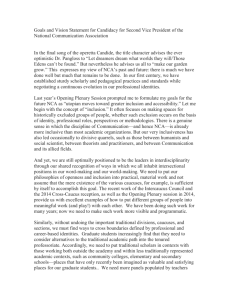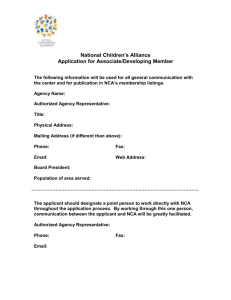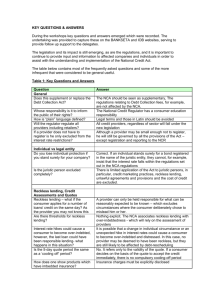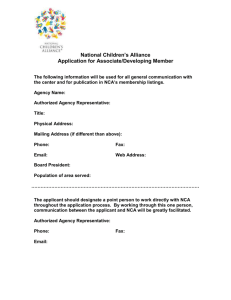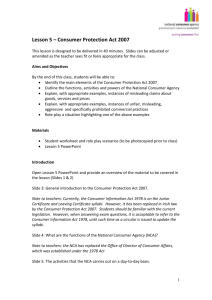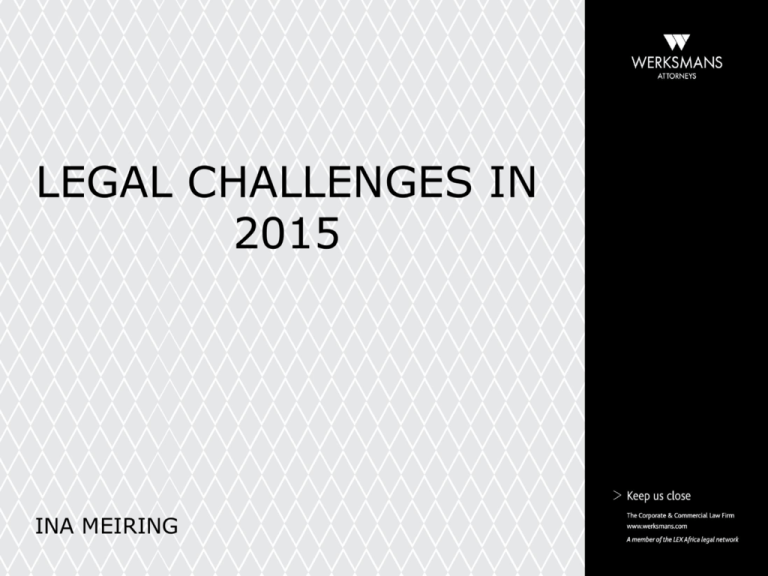
LEGAL CHALLENGES IN
2015
INA MEIRING
TOPICS
>Section 103(5): The guideline issued by the
NCR
>Excluded agreements subject to the NCA
>Prescription
>Payment distribution agents
2
PROPOSED GUIDELINES:
SECTION 103(5)
> Section 103(5):”Despite any provision of the common law or a
credit agreement to the contrary, the amounts contemplated
in section 101 (1) (b) to (g) that accrue during the time that a
consumer is in default under the credit agreement may not, in
aggregate, exceed the unpaid balance of the principal debt
under that credit agreement as at the time that the default
occurs.”
> Principle 4.2:Once the consumer has purged the default by
paying all the arrears in relation to the section 101(1)(b)-(g)
charges, section 103(5) no longer applies. If the consumer
defaults again, section 103(5) becomes operative and the
amounts that accrued during the first period of default should
be added to the amounts that accrue during the second period
of default and any subsequent periods of default to determine
the amount of the section 101(1)(b)-(g) charges that should
not exceed the balance of the unpaid principal debt. The
balance of the unpaid principal debt that should be used in
these circumstances is as at the second period of default and
any subsequent periods of default
3
DEFAULT: SECTION 103(5)
> It is therefore important to determine > the moment when a consumer falls into default, because
that moment determines the amount of charges that may
accrue during the period the consumer is in default; and
> the moment when the default is cured or purged, because
only then would the credit provider again have an
enforceable right to the charges outlined in section
101(1)(b) to (g).
4
WHEN IS THE DEFAULT CURED?
> If novation were to occur in respect of a credit agreement,
the novation will result in the extinguishing of the credit
agreement and the replacement of that credit agreement
with a new credit agreement. Default is thus cured.
> The credit provider would not be entitled to enforce the “old”
agreement, and will only be able to rely on the new credit
agreement for such purposes. The credit provider thus
“loses” the right to pursue the consumer for any default in
respect of the old agreement.
> Apart from discharging the obligations between the parties, a
novation also releases pledges and securities held in respect
of the old agreement and results in the discharge of sureties.
5
NOVATION
> Because it is a new agreement, the credit provider must> conduct a fresh credit assessment in respect of the
consumer as contemplated in section 81(2) of the NCA;
> provide the consumer with a pre-agreement statement
and quotation in the prescribed form, which allows the
consumer 5 (five) business days within which to consider
whether to enter into the contemplated credit agreement
or not (see section 92 of the NCA);
> release existing accessory obligations such as suretyships
and other securities and pledges and replace them with
new agreements for these purposes.
6
RESTRUCTURE AGREEMENTS
> If the parties have voluntarily restructured a debt, the result
which is that the parties agree that consumer is no longer in
default of the original agreement, and in terms of which the
consumer will only be in default of he/she defaults on the
repayment obligations in terms of the restructure
agreement, such an agreement will also purge the default for
purposes of section 103(5)
> It is clear from a reading of section 3 and of sections 86 to
88 of the NCA that restructure agreements are encouraged
as are the eventual fulfilment of the consumer's financial
obligations.
7
RESTRUCTURE AGREEMENTS
> In terms of section 2(1), the NCA must be interpreted in a manner that
gives effect to the purposes in section 3. The purposes of the NCA as
set out in section 3, include (amongst others) the following–
> promoting responsibility in the credit market by encouraging
responsible borrowing, avoidance of over-indebtedness
fulfilment of financial obligations by consumers;
and
> promoting equity in the credit market by balancing the respective
rights and responsibilities of credit providers and consumers;
> addressing and preventing over-indebtedness of consumers, and
providing mechanisms for resolving over-indebtedness based on the
principle of satisfaction by the consumer of all responsible financial
obligations; and
> providing for a consistent and harmonised system of debt
restructuring, enforcement and judgment, which places priority on
the eventual satisfaction of all responsible consumer obligations
under credit agreements.
8
RESTRUCTURE AGREEMENTS
> The restructure agreement is a mechanism for resolving a
consumer's over-indebtedness based on the principle of
satisfaction by the consumer of all responsible financial
obligations.
> In Imperial Bank v Kubheka (Unreported judgment 2010 JDR
0077(GNP)) the court stressed the importance to provide for
debt re-organisation in cases of over indebtedness (par 19)
> The court further emphasised that the objective of the NCA
in making it possible for the parties to a credit agreement to
resolve their dispute or bring payment up to date, should
always be primary without comprising each other's right (par
58).
9
EXCLUDED AGREEMENT SUBJECT TO
THE NCA
> First National Bank, a Division of FirstRand Bank Ltd v Clear
Creek Trading 12 (Pty) Ltd and Another 2014 (1) SA 23 (GNP):
> There is no objection in principle to parties agreeing to make a
normally excluded agreement subject to the National Credit Act
34 of 2005.
> FNB wanted to enforce a home loan agreement which stated in
clause 1 that it was 'governed by the National Credit Act'. While
the defendants raised several defences located exclusively within
the NCA, FNB argued that the agreement was not subject to the
NCA because it was excluded from its ambit by s 4(1)(b) read
with s 9(4): It was a 'large agreement' as defined and the
consumer was a juristic person whose asset value exceeded the
statutory threshold.
10
EXCLUDED AGREEMENT SUBJECT TO
THE NCA
> FNB argued that the reference to the applicability of the NCA
was probably a mistake and should be ignored by the court. FNB
did not, however, bring an application for the rectification of the
agreement.
> Held: The parties would in principle be held to their agreement.
If FNB's stance were that the reference to the NCA was a
mistake, it should have applied for the rectification of the
agreement. In absence of such an application oral submissions
about the non-applicability of the NCA carried little weight. Nor
did the NCA's stated objective of protecting consumers preclude
those falling outside its ambit from agreeing to have its
protection extended to them. To the contrary, such an
agreement would advance the objectives of the NCA by
extending its protection to the parties involved. In summary,
considerations of contractual freedom, the pacta sunt servanda
principle, and public policy dictated that the court should
enforce clause 1 of the agreement
11
PRESCRIPTION
> National Credit Amendment Act 19 of 2014 (“NCAA”)
> Section 126B has been added by section 31 of the NCAA, and reads
as follows:
> "(1) (a) No person may sell a debt under a credit agreement to
which this Act applies and that has been extinguished by
prescription under the Prescription Act, 1969 (Act No. 68 of 1969).
> (b) No person may continue the collection of, or re-activate a debt
under a credit agreement to which this Act applies—
> (i) which debt has been extinguished by prescription under the
Prescription Act, 1969 (Act No. 68 of 1969); and
> (ii) where the consumer raises the defence of prescription, or would
reasonably have raised the defence of prescription had the
consumer been aware of such a defence, in response to a demand,
whether as part of legal proceedings or otherwise.’’.
12
PRESCRIPTION
> Investec Bank Ltd t/a Investec Private Bank v Ramurunzi
2014 (4) SA 394 (SCA)
> “Where, in apparent contravention of s 129(1)(b) of the
National Credit Act 34 of 2005 (the NCA), a credit provider
institutes action to enforce payment of a debt arising from a
credit agreement prior to delivery to the consumer of a
notice of default, the action is not void but subject to the
court making an order in terms of s 130(4) as to how the
proceedings are to be continued. In the present case this
meant that prescription of the debt concerned had been
interrupted by service of the summons despite the absence
of proper delivery of a s 129 notice to the consumer.”
13
PAYMENT DISTRIBUTION AGENTS
(“PDA”)
> In terms of section 7(c) of the National Payment System Act 78 of
1998 ("NPS Act"), a person (who is not a bank) may as a regular
feature of that person's business accept money or payment
instructions from any other person for purposes of making payment
on behalf of that other person to a third person to whom that
payment is due, if the money is accepted or payment made in
accordance with directives issued by the Reserve Bank from time to
time in terms of section 12.
> The South African Reserve Bank ("SARB") has issued Directive 1 of
2007 published under GN 1110 in GG 30261 of 6 September 2007
("Directive").
> In terms of the Directive, a PDA would be acting as a "payer service
provider", which is a person who accepts money or the proceeds of
payment instructions, as a regular feature of the person's business,
from a payer (i.e. the consumer) to make payment on behalf of
that payer to multiple beneficiaries (i.e. credit providers).
> Contravention of this Directive is an offence in terms of section 12
of the NPS Act.
14
PAYMENT DISTRIBUTION AGENTS
> NCAA: “payment distribution agent” means a person who
on behalf of a consumer, that has applied for debt review in
terms of this Act, distributes payment to credit providers in
terms of a debt-rearrangement, court order, order of the
Tribunal or an agreement”
> Section 44A: registration of payment distribution agents.
> Nedbank Ltd v Thompson and Another 2014 (5) SA 392 (GJ)
> The Thompsons fell behind with their payments under a debt
review order which included their mortgage bond obligations
to Nedbank.
The 'default' was caused by the PDA
erroneously deducting a payment from the Thompsons'
contribution before paying the creditors.
15
PAYMENT DISTRIBUTION AGENTS
> The bank invoked s 88(3)(b)(ii) of the NCA to obtain
judgment against the Thompsons.
> This subsection provides that if 'the consumer defaults on
any obligation in terms of a re-arrangement agreed between
the consumer and credit providers, or ordered by a court or
the Tribunal', the credit provider may (subject to ss 86(9)
and 86(10) of the NCA) enforce the credit agreement
concerned.
> At the time that Nedbank brought its application, the net
shortfall owing to the bank was only R440,91.
16
PAYMENT DISTRIBUTION AGENTS
> The court, dismissed the application by Nedbank:
> The appointment of the PDA by the debt counsellor was an
administrative one over which the consumer had no control.
> Section 7 of the NPS Act did not create an agency relationship
between the PDA and the consumer.
> In the absence of an agreement between the PDA and the
consumer that the former would act as the latter's agent, it
could not be held that the PDA in question acted as the agent of
the consumer and that its actions or inactions would bind the
consumer.
> Accordingly the 'default' was not a default by the Thompsons,
and the requirements of s 88(3)(b)(ii) were not met.
17
PAYMENT DISTRIBUTION AGENTS
> “But
even if this were the wrong conclusion,
ss 2(1) and s 3 of the NCA required the
word 'defaults' in s 88(3)(b)(ii) to be
interpreted to exclude minor, unwitting and
excusable defaults of the nature which
occurred here, with the result that for that
reason too the requirements of s 88(3) had
not been met” (i.e. … “promoting equity in
the credit market by balancing the
respective rights and responsibilities of
credit providers and consumers”.
18
DIRECTIVE 1
> The PDA must –
> ensure that it is appointed as an agent of each payer when
acting as payer service provider;
> as a payer service provider, keep records of payments to
third persons which must include, inter alia, the date,
amount and payer of the transaction. Such records must be
retained for a period of five years;
> ensure that the services it provides, including the systems
that it uses, are safe and efficient so as not to introduce risk,
including reputational risk, into the NPS;
> inform its banker of its involvement in payments to third
persons who, in turn, must inform the payment system
management body in a format acceptable to that body.
19
THE PDA AS AGENT OF THE CONSUMER
> In terms of the contract of mandate, the one party (the
mandatary) undertakes to perform a mandate or task for the
other (the mandator). The contract of mandate usually
creates rights and duties only between the parties to it. It
may however, also be combined with an authority given by
the mandator to the mandatary in terms of which the
mandatary has the power to represent the mandator.
> In contrast, in the case of agency, the agent concludes a
juristic act on behalf of or in the name of another, the
principal and the agent can also create, alter, or extinguish
rights for its principal.
> The PDA acts as mandatary and not as agent when
authorised by the consumer (via the debt counsellor) to pay
the money to the credit provider;
20
THANK YOU
17 February 2015
Legal notice: Nothing in this presentation should be construed as
formal legal advice from any lawyer or this firm. Readers are
advised to consult professional legal advisors for guidance on
legislation which may affect their businesses.
© 2014 Werksmans Incorporated trading as Werksmans Attorneys.
All rights reserved.

